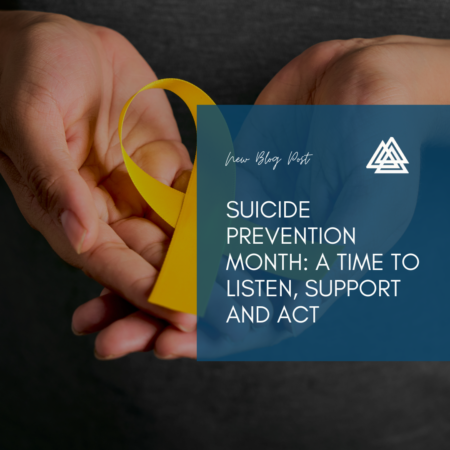 September is Suicide Prevention Month, a crucial time to raise awareness, foster conversations, and take meaningful action to prevent suicide. Suicide is a complex and deeply painful issue that affects individuals, families, and communities worldwide. It’s a topic that many find difficult to discuss, but open conversations can save lives. This month, let’s commit to being present, offering support, and understanding the importance of mental health.
September is Suicide Prevention Month, a crucial time to raise awareness, foster conversations, and take meaningful action to prevent suicide. Suicide is a complex and deeply painful issue that affects individuals, families, and communities worldwide. It’s a topic that many find difficult to discuss, but open conversations can save lives. This month, let’s commit to being present, offering support, and understanding the importance of mental health.
Understanding the Scope of Suicide
Suicide is one of the leading causes of death globally, claiming nearly 800,000 lives each year according to the World Health Organization. In the United States alone, suicide is the 10th leading cause of death, with an estimated 48,000 people dying by suicide annually. These are not just statistics—they represent loved ones, friends, and community members who were lost too soon.
Recognizing the Warning Signs
One of the most important steps in suicide prevention is recognizing the warning signs that someone may be at risk. These signs can vary, but some common indicators include:
- Talking about wanting to die or expressing hopelessness.
- Withdrawal from friends, family, and social activities.
- Changes in behavior or mood, such as increased aggression, irritability, or a sudden calmness after a period of despair.
- Giving away possessions or saying goodbye to loved ones.
- Increased use of alcohol or drugs.
- Engaging in risky or self-destructive behaviors.
If you notice these signs in someone you know, it’s important to take them seriously and offer support.
How to Help: Start the Conversation
Starting a conversation about suicide can be daunting, but it can make all the difference. Here are some steps you can take to offer support:
- Ask Directly: If you’re concerned that someone may be thinking about suicide, ask them directly. It’s okay to say, “Are you thinking about suicide?” This shows that you care and are willing to listen.
- Listen Without Judgment: Give the person space to share their feelings without interrupting or offering solutions right away. Sometimes, just being heard can be incredibly healing.
- Encourage Professional Help: Gently encourage the person to seek help from a mental health professional, such as a therapist, counselor, or psychiatrist. You can offer to help them find resources or accompany them to an appointment if needed.
- Stay Connected: Follow up with the person regularly. Let them know you’re there for them, even after the immediate crisis has passed.
- Know the Resources: Familiarize yourself with suicide prevention resources, such as the National Suicide Prevention Lifeline (1-800-273-TALK), Crisis Text Line (text HOME to 741741), and local mental health services.
Breaking the Stigma
One of the biggest barriers to suicide prevention is the stigma surrounding mental health. Many people feel ashamed or embarrassed to talk about their struggles, which can prevent them from seeking help. By speaking openly about mental health and suicide, we can break down these barriers and create a culture of acceptance and support.
It’s important to remember that mental illness is not a sign of weakness, and asking for help is a sign of strength. Whether you’re struggling with suicidal thoughts or know someone who is, it’s okay to seek support. No one should have to face these challenges alone.
The Importance of Self-Care
For those who have lost someone to suicide or who are supporting someone in crisis, it’s crucial to prioritize self-care. Supporting a loved one through a mental health crisis can be emotionally exhausting, and it’s important to take time for yourself to recharge and process your feelings.
Self-care can include activities that promote relaxation and well-being, such as exercise, meditation, spending time with loved ones, or seeking support from a therapist or support group. Remember, you can’t pour from an empty cup—taking care of yourself allows you to be there for others.
Every Life Matters
Suicide Prevention Month is a reminder that every life is valuable and that we all have a role to play in supporting those who are struggling. By recognizing the signs, starting conversations, and offering support, we can make a difference in the lives of those at risk. Let’s commit to being present, listening without judgment, and advocating for mental health. Together, we can create a world where everyone feels seen, heard, and supported.
If you or someone you know is in crisis, reach out to the National Suicide Prevention Lifeline at 1-800-273-TALK (8255) or text HOME to 741741 to connect with a trained crisis counselor. Help is available, and you are not alone.
